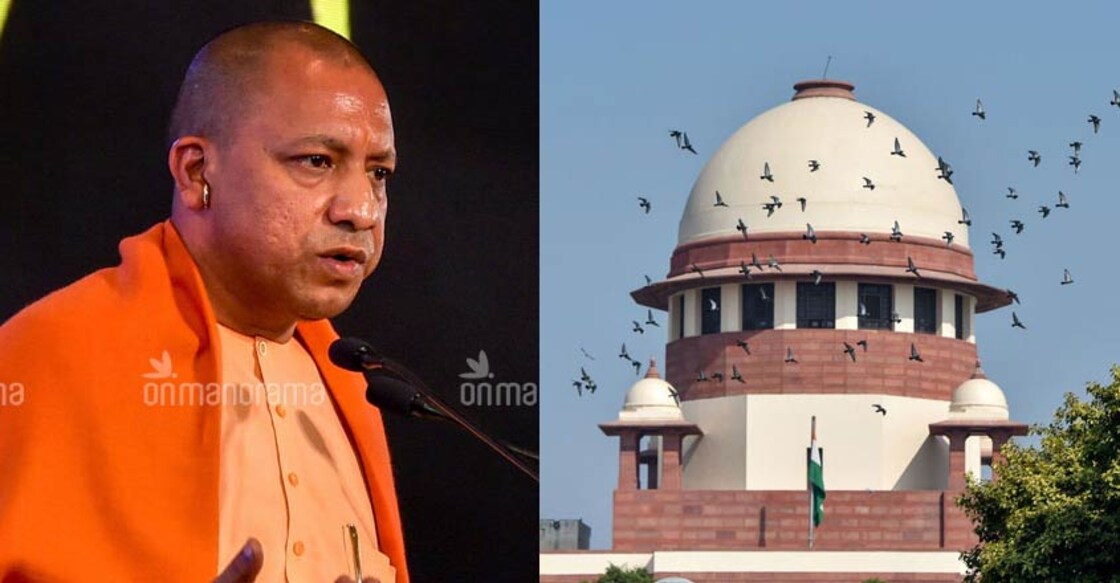Posters of anti-CAA protesters in Lucknow: No law to back UP govt's action, says SC

Mail This Article
New Delhi: The Supreme Court on Thursday told the Uttar Pradesh government that there is "no law" which backs its action of putting up posters on roadsides with details of those accused of vandalism during anti-CAA protests in Lucknow.
The top court, while referring the appeal of the state government to a larger three-judge bench next week on the ground that it required "further elaboration and consideration", put a poser saying whether the fundamental right to privacy of alleged protesters can be waived by the state by "castigating them for all times" to come.
A vacation bench of justices U U Lalit and Aniruddha Bose did not stay the Allahabad High Court's March 9 order asking the Lucknow administration to remove the posters. Solicitor General Tushar Mehta, appearing for the state, also did not press for the stay of the order.
"As of now there is no law which backs your (state) action. The action of state has to be backed by some law," the bench said.
"We direct that let the papers be placed before Chief Justice of India S A Bobde so that a bench of sufficient strength considers the matter in the coming week," it said.
The top court, however, said it understood the "anxiety" of the state government and there was "no doubt" that the rioters should be punished and told to compensate the damages.
It said though there is no doubt that there should not be any kind of vandalism and the accused should be booked, the question is "can the state go two stages beyond that" and decide to name and shame the protesters.
The law officer said once a person decides to put himself in public domain, like by wielding a gun, then he cannot come and say that he has the right to privacy and media should be restrained from publicising him.
"If your unruly behaviour is video-graphed, then you have put yourself in public glare. But here, we are on a slightly different footing and the issue is can the state waive off the privacy rights of persons to castigate them for all times," the bench observed.
It said there is a difference between rights of an individual and those of the state, which must be backed by law.
"Individuals can do anything but the state has to act in accordance with the law. Here, in this case, where is that power?" the bench asked when the law officer said the court has to see the national interest and the damages caused to public properties.
Justifying the state action, the law officer said it was a matter of "great importance" and there was apprehension that the alleged rioters may dispose their properties despite there being recovery notices against them.
Mehta told the court that the posters were put up as a "deterrent" and the hoardings only said that these persons were liable to pay for their alleged acts during the violence.
Mehta, who was assisted by Uttar Pradesh's Advocate General Raghuvendra Singh, assailed the Allahabad High Court's decision to take suo motu (on its own) cognisance of the issue and said it was done despite the fact that several petitions of alleged rioters were pending before the Lucknow bench of the high court.
He said initially 94 people were identified and summoned by the competent authority. After hearing them, recovery notices were issued against 57 alleged rioters belonging to various communities.
Senior advocate A M Singhvi, appearing for former IPS officer S R Darapuri, who is among those who feature in the posters, told the bench that the state was duty-bound to show the authority of law backing its action.
He said the action of the Uttar Pradesh government amounted to a "mega blanket" approach of naming and shaming these persons without final adjudication and it was an open invitation to common men to lynch them as the posters also have their addresses and photographs.
"I am giving the extreme example of a child rapist and a murderer. When did we hear the example of naming and shaming an accused? If such an accused walks on the streets after getting bail then he is likely to be lynched if he has been named and shamed," Singhvi said.
"We don't have an anarchy in the state that the government will start doing this," he said.
Senior Advocate Colin Gonsalves, appearing for another alleged protester, said his client is a lawyer and has faced assaults in the past for taking up the causes of minorities, and he may be attacked due to the publication of his name and address.
Another senior advocate C U Singh said the state government was following a "vindictive approach" and the sharing of details of a person would make him vulnerable.
He said the source of such a power to put up posters of protesters should emanate from a law, not from guidelines or executive orders.
The Uttar Pradesh government had moved the top court challenging the Allahabad High Court order which directed the state administration to remove the posters.
The high court had also directed the district magistrate and the Lucknow police commissioner to submit a compliance report on or before March 16.
The posters were displayed to "name and shame" the accused who had allegedly caused damage to public property during the protests against the Citizenship (Amendment) Act(CAA) in the state capital on December 19 last year.
Besides IPS officer Darapuri, activist-politician Sadaf Jafar is among those whose names and photos have been put up at major road crossings in Lucknow.

